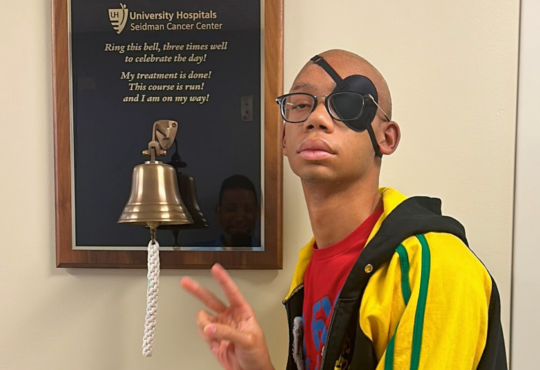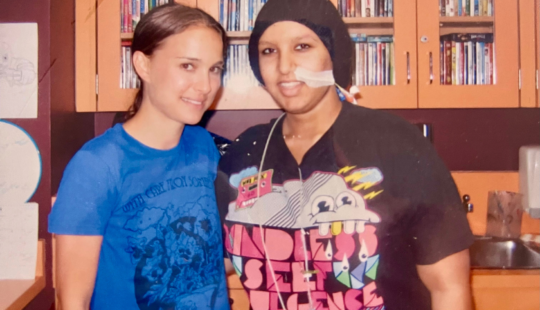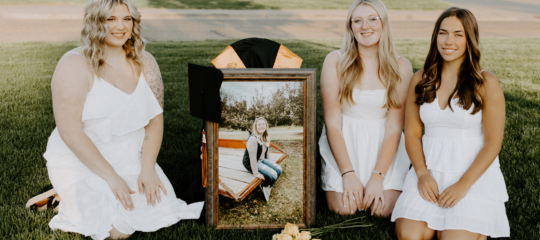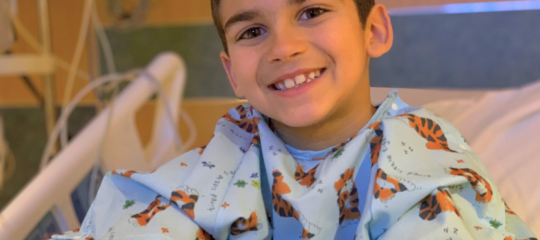
Art, Advocacy, and a Masters Degree: Juhee’s Life After Medulloblastoma

At just 17 years old, Juhee’s life took an unexpected turn. What should have been a time filled with anticipation for high school graduation and moving on to college was abruptly altered by a diagnosis of medulloblastoma. “It was my senior year of high school, and it felt like the future was full of endless possibilities,” Juhee recalls. “Suddenly, that all kind of went kaput.”
A varsity color guard member, Juhee first noticed something was wrong during practice. A skilled gymnast with a strong sense of balance, she began struggling with simple movements. “I couldn’t balance on one foot or walk in a straight line,” she says. Intense headaches followed, which her doctor initially dismissed as migraines—a condition that ran in her family. But Juhee persisted, knowing something wasn’t right. Tests confirmed her fears: she had a malignant brain tumor.
The diagnosis marked the beginning of a grueling treatment journey, including six weeks of radiation followed by chemotherapy. Complications like pancreatitis delayed her recovery. Despite the physical and emotional toll, Juhee maintained a positive outlook, crediting her culture, faith, and strong family support. “Sometimes I just had to laugh at all the crappy things that were going on in my life,” she says. “There’s something about being close to death that really provides clarity to what’s important and what’s worth getting upset about.”
Juhee’s cancer experience taught her many lessons, but perhaps the most profound was understanding the power of self-advocacy and community. At the hospital, she learned about the Pediatric Brain Tumor Foundation (PBTF), which offered resources and support systems. “The best time to seek help is as soon as you’re diagnosed,” Juhee advises. “Organizations like PBTF can guide you through the overwhelming fear and everyday challenges.”
Art as a Lifeline
During treatment, Juhee discovered the healing power of art therapy. An art therapist at her hospital introduced her to creative expression as a way to process emotions she couldn’t articulate through words. “My art therapist was so wonderful. She always made me feel like I could do more” she shares.
Now in her final year of graduate school, Juhee is pursuing a master’s degree in art therapy and marriage and family therapy. She dreams of helping others find solace through creativity, just as she did. “Therapy isn’t one-size-fits-all, and talk therapy doesn’t work for everyone,” Juhee explains. “Art can be such a powerful medium for healing, and you don’t need to be skilled at it. Even scribbling on a piece of paper can be transformative.”
Juhee’s passion lies in working with individuals who feel “othered,” whether due to disability, cultural stigma, or life circumstances. “Growing up South Asian, therapy wasn’t something we talked about,” she says. “I want to change that. No one should feel alone or misunderstood because of their experiences.”
Learning to Navigate Life
After her recovery, Juhee faced additional hurdles, from coping with lingering health effects to navigating higher education as a disabled student. She highlights the importance of knowing your rights under the Americans with Disabilities Act (ADA) and advocating for accommodations. “Accommodations aren’t special treatment—they’re equity,” Juhee emphasizes. “You deserve a seat at the table.”
She encourages others to educate themselves about disability laws and resources. “If someone tries to invalidate your experience because you ‘don’t look disabled,’ remember: they don’t know your story; you do.”
Juhee’s journey also brought her a sense of clarity about life’s priorities. “Cancer taught me what really matters,” she reflects. “It’s not about worrying over small things or people’s opinions—it’s about living authentically and finding joy in each day.”
A Message of Hope
Juhee’s resilience and determination inspire her mission to help others. She believes in the strength that comes from embracing one’s identity, including disability. “Your disability isn’t a weakness; it’s a power,” she says. “Learn how to wield it. You should advocate for yourself unapologetically.”
Her advice to others facing similar challenges is clear: seek help, embrace community, and allow yourself to grieve. “It’s okay to feel the weight of your emotions,” Juhee says. “Cry, grieve, and then move forward at your own pace.”
As Juhee looks to the future, her goal is to create spaces where people feel seen, heard, and valued. “I don’t want anyone to feel the isolation I did,” she says. “Art therapy can be a bridge to understanding, healing, and connection.”
For Juhee, her journey with medulloblastoma wasn’t just a challenge—it was a lesson. “I wouldn’t be the person I am today without this experience,” she says. “It gave me the spirit to keep going and the desire to help others do the same.”
Through her work, Juhee is transforming her knowledge and experience into hope, demonstrating that even in the face of life’s toughest trials, there is room for creativity and joy.
Related Stories


A Circle of Support: The Kaczmarski Family’s Journey from Receiving to Giving Back

A Mother’s Intuition Leads to a Life-Saving Procedure
Related Updates
The Pediatric Brain Tumor Foundation welcomes Day One Biopharmaceuticals’ renowned Dr. Samuel C. Blackman to its Board of Directors
Pediatric Brain Tumor Foundation Statement on the Reported NIH Grant Review Pause

